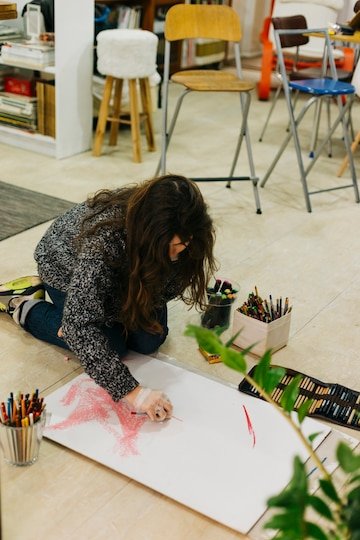Introduction to Refined Conceptual Study in Drawing
In the realm of art, the refined conceptual study in drawing is an essential process that transforms simple lines into complex stories. This practice involves exploring ideas and emotions through sketches and drawings, allowing artists to translate abstract concepts into visual narratives. For art students, illustrators, and creatives, understanding and mastering refined conceptual studies can elevate their work, offering depth and new perspectives.
The purpose of this blog post is to demystify the refined conceptual study and demonstrate its significance to your artistic development. We will explore the benefits, techniques, and resources that can enhance your drawing skills. By the end of this article, you’ll understand how to integrate conceptual studies into your routine and unlock a higher level of creativity.
Importance of Refined Conceptual Study for Art Students and Creatives
For art students, the refined conceptual study in drawing is more than just an academic exercise; it’s a gateway to honing one’s unique voice. This practice encourages critical thinking and problem-solving, skills that are invaluable in both artistic and everyday contexts. By engaging in conceptual drawing studies, students can deepen their understanding of composition, perspective, and emotive storytelling.
Creatives often find that refined drawing studies help them break free from conventional thinking. By encouraging experimentation, these studies foster innovation and originality. This process is particularly crucial in today’s fast-paced, visually-driven world, where standing out is paramount. Artists who regularly practice conceptual drawing are better equipped to create work that resonates on multiple levels.
Furthermore, engaging in refined conceptual study builds confidence. It allows artists to explore and test ideas without the pressure of producing a final piece. This freedom to experiment can lead to unexpected discoveries and breakthroughs, enhancing overall artistic growth.
Techniques and Approaches for Conducting Refined Conceptual Studies in Drawing

When embarking on a refined conceptual study in drawing, there are several techniques and approaches one might consider. The first step is to start with a clear concept or theme. This could be a specific emotion, idea, or even a question you’re curious about. Having a focal point provides direction and helps maintain coherence throughout the study.
Once a concept is defined, employ brainstorming techniques to expand on the idea. Mind mapping, for example, is an effective way to visualize relationships between different elements of your concept. This process can help uncover hidden connections and inspire new angles for your drawings.
Another key approach is to experiment with different drawing styles and mediums. Combining pencils, charcoal, ink, and digital tools can yield unique results and push the boundaries of traditional drawing. By diversifying your methods, you can discover new techniques that enhance your conceptual storytelling.
Case Studies: Examples of Successful Refined Conceptual Studies in Drawing
There are many notable artists who have successfully utilized refined conceptual studies in their work. One such example is Leonardo da Vinci, whose sketchbooks are filled with intricate studies exploring everything from anatomy to geometry. His ability to merge art and science through his drawings exemplifies the power of conceptual studies.
Contemporary artists also provide insightful case studies. Take, for instance, the work of Julie Mehretu, known for her abstract cityscapes. Her drawings begin with conceptual studies that layer architecture, history, and personal narrative, resulting in complex, dynamic pieces that challenge perceptions.
Another successful example is the work of Cy Twombly, whose scribbles and symbols convey profound emotional depth. His drawings illustrate how refined conceptual studies can distill complex ideas into deceptively simple forms, inviting viewers into an intimate dialogue with the artwork.
Tools and Resources for Enhancing Refined Conceptual Studies
Having the right tools and resources is crucial for conducting effective refined conceptual studies. Traditional drawing materials, such as sketchbooks, pencils, and erasers, remain staples for many artists. These tools offer tactile feedback that can enhance the creative process.
Digital tools like tablets and software such as Adobe Illustrator or Procreate have become increasingly popular. These platforms provide flexibility and ease of experimentation that traditional mediums may not offer. They allow for seamless editing, layering, and exploration of complex ideas in a non-destructive way.
In addition to tools, numerous resources can aid your conceptual studies. Online platforms like Skillshare and MasterClass offer courses taught by professional artists, providing valuable insights and techniques. Books on art theory and history can also inspire and inform your studies, offering new perspectives and ideas to explore.
Tips for Incorporating Refined Conceptual Study into Regular Drawing Practice
Incorporating refined conceptual studies into your regular drawing practice doesn’t have to be daunting. Start by setting aside dedicated time each week to focus solely on conceptual exploration. This routine will help build discipline and ensure consistent progress in your artistic development.
Create a dedicated space where you can draw without distractions. Having a specific environment can foster creativity and make it easier to enter a focused state of mind. Fill this space with inspiring materials, such as art books, prints, and personal sketches that fuel your imagination.
Finally, don’t shy away from collaboration. Share your work with peers or mentors, and seek feedback on your conceptual studies. Engaging with others can provide valuable insights and push your ideas further, leading to richer and more nuanced drawings.
Conclusion
Refined conceptual study in drawing is a powerful tool for art students, illustrators, and creatives seeking to elevate their skills and express complex ideas. Through thoughtful exploration and experimentation, artists can develop unique voices that resonate deeply with audiences.

